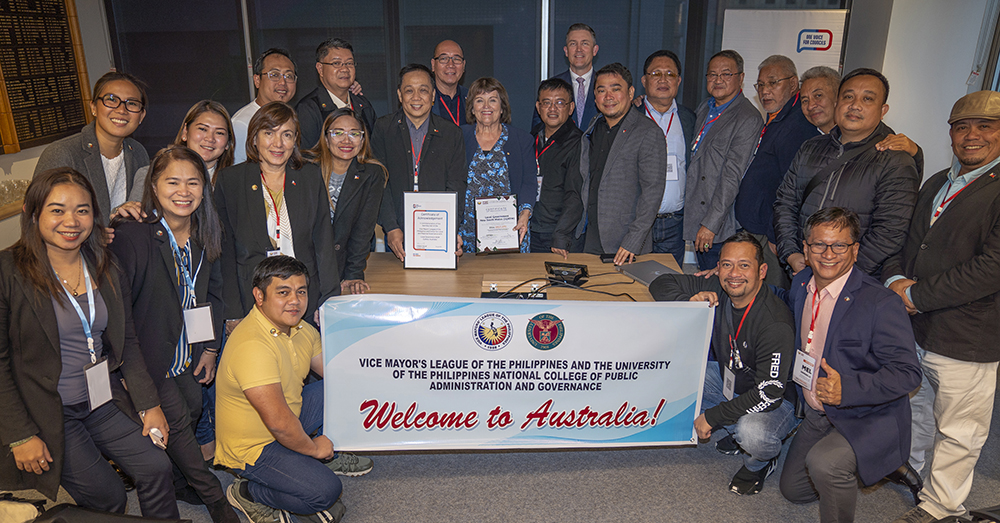
The role of local government in creating sustainable and smart cities was the focus of a visit by a delegation from the Philippines in Sydney last week.
2 July 2024
Assembly discusses challenges and opportunities
I’m writing to you as part of a big week in Canberra with the Annual General Assembly for our National peak body, ALGA, taking place.
The General Assembly is a unique opportunity to bring together our council colleagues from all over Australia to hear from our federal leaders and to discuss the common challenges and opportunities impacting our sector.
Also, on Friday I will be representing our organisation at the National Council of Local Government, hosted by the Federal Albanese Government. I look forward to reporting back to you next week on the outcomes and key discussions taking place in our national capital this week.
No doubt one of the "hot topics" for the week will be that of Financial Assistance Grants.
The Federal Government announced on Friday that it is bringing forward payment of 85 per cent of the FA Grants for 2024-2025 to the 2023-2024 financial year. All councils should now have received these allocations.
FA Grants are so important for our sector and it remains a top advocacy priority for LGNSW and for ALGA to see these grants restored to one per cent of Commonwealth taxation revenue. I look forward to continuing to make representations on this matter alongside so many of you at the ALGA National General Assembly in Canberra this week.
Low rise reforms commence
The NSW Government’s density reforms, aimed at achieving housing accord targets, started this week, with dual occupancies and semi-detached dwellings now more permissible in R2 residential zoned land in most LGAs.
The NSW Government has adjusted its earlier proposal by limiting the applicability of this reform where land is at risk of bushfires and floods, as well as a number of other considerations.
I thank the NSW Government for listening to councils on this important matter, and for continuing to work with local governments. It is so important that density is done well, in partnership with local governments, and accompanied by investment in infrastructure to ensure quality of life for all communities.
The NSW Government advises its other low and mid-rise reforms will begin later this year. As the NSW Government continues its reforms, it is helpful for our advocacy on your behalf to understand the local implications in your LGA.
To provide feedback to bolster our advocacy for the best outcomes for all members of your communities, please email [email protected].
Conference motions open this month
Our annual conference will take place in Tamworth from 17-19 November.
LGNSW members can submit motions for the conference from Wednesday 17 July. The 2024 motion submission guide is now available online and I encourage you all to familiarise yourself with the revised criteria for motions.
Resolutions of our annual conferences establish our sector wide policy positions and guide our advocacy.
As attendees to past conferences will be aware, it’s usually possible to consider a maximum of about 100 motions during conference debate. With 128 councils across NSW, as well as county councils and other related organisations, it can be challenging if councils submit a large number of motions.
LGNSW is asking members to submit only their highest priority motions for debate. As usual, LGNSW will group similar motions and identify a primary motion for debate. And just a reminder that motions that are consistent with existing LGNSW positions will not be brought forward for debate.
We look forward to receiving motions from your council and to seeing you all in Tamworth in November.
Embodied carbon
In good news for the environment, state and federal building Ministers have agreed to add climate resilience as an objective of the Australian Building Codes Board, and to include a voluntary pathway for commercial buildings to calculate and report on embodied carbon in the 2025 National Construction Code, with the Australian Building Codes Board tasked to investigate how to incorporate a future minimum standard in the NCC 2028.
Resolution 68 of the 2023 Annual Conference, submitted by Clarence Valley Council, called on LGNSW to advocate to the NSW Government to prepare a policy and associated legislation or other regulatory mechanism/s to require manufacturers of new building products sold in NSW to declare the level of carbon emissions generated to make the product, to enable consumers to make informed decisions about the carbon footprint of new building works, including renovations.
I wrote to the NSW Government on this matter late last year and I am so pleased to now see this matter progress.
Local Government elections – start of capped expenditure period
For all candidates standing at the local government elections in September, the NSW Electoral Commission continues to provide information and resources on its website. A reminder that the capped expenditure period for the local government elections has now started (from Monday 1 July 2024).
Ambulance services in regional NSW – Auditor-General report
The NSW Auditor-General has released its performance audit of ambulance services in regional NSW.
Overall, the report found that NSW Health is maintaining the effectiveness of ambulance services in regional New South Wales, despite increasing demand.
However, the audit also found that for more than a decade NSW Health has not had a cohesive state-wide policy to address well known transport needs affecting health outcomes and service delivery in regional and rural New South Wales.
I heard this same sentiment loud and clear in your responses to my request for feedback on this matter earlier this month, to assist with responding to a question on notice from the parliamentary inquiry into rural and regional health services.
Thank you to all of you who provided input – I look forward to sharing the response with you once the committee has made it available. The provision of adequate healthcare services and facilities and equitable access to those services and facilities – particularly for rural, regional and remote communities – remains a top priority for LGNSW and we will continue to advocate on behalf of our communities.
Veterinary shortage – inquiry report published
The parliamentary inquiry into the veterinary workforce shortage in NSW published its report last week, with some disappointing commentary.
The committee noted that vets are often working without recompense when boarding and treating stray animals presented to them by members of the public, including where the local pound will not accept animals out of hours, or where the owner cannot be located.
The committee noted it was concerned at what it termed “cost shifting” from local government authorities to veterinary clinics.
The cost shift for companion animals management does not come from councils, rather it is heavily placed on councils. LGNSW’s most recent report on cost shifting found that for management of companion animals, the estimated total cost shift onto NSW councils was $29.6 million for 2021-22.
The subsidies councils receive from the NSW Government do not come close to covering the full cost of companion animal functions, such as the need for councils to provide appropriate care for animals including nutrition, veterinary care, enrichment activities, and shelter.
Councils need additional financial investment from the NSW Government in pound/rehoming facilities, including regional facilities in more densely populated areas. This funding would allow for upgrading of pound facilities, provision of support services to facilitate rehoming, and education to the community about responsible pet ownership.
And so I am pleased that the committee has recommended that the NSW Government ensures that appropriate funding is provided to councils to ensure there is a consistent interpretation of the Act across all local government areas.
Visit by the Vice Mayors’ League of the Philippines
We shared a delightful afternoon recently with some local government colleagues from the Philippines who were in Sydney as part of a study tour looking at the role councils can play in the development of smart cities.
The delegation included 35 national executive board members from the Vice Mayors’ League of the Philippines (VMLP), as well as representatives of the Centre for Local and Regional Governance (CLRG), University of the Philippines-National College of Public Administration and Governance (CPAG).
The tour aimed to provide professional development relevant to the Vice Mayors in their role, through exposure to international policies and processes in enabling smart city development.
The learning visit was a really enjoyable and enriching experience for all involved and was a good reminder of the important leadership role that local government needs to take in ensuring communities are not left behind in this era of rapid technological advancement.
The development of smart cities is an important area of study for local government organisations all over the world as we prepare ourselves and our communities for change. Thank you to those individual councils who also took the time to meet the delegation and share your valuable experiences with them. This kind of ongoing exchange of knowledge and information is an important reminder of the key role of local government around the world.
Sincerely,

BACK TO MAIN PAGE